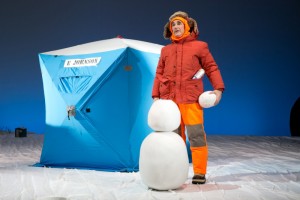Nice Fish: A Reverie on Life
Louis Jenkins’s poem, “The Afterlife” begins: “I didn’t get it,” they are saying.
“Older people are exiting this life as if it were a movie.”
He says, “It didn’t seem to have any plot.”
Those words characterize Mark Rylance and Jenkins’ play Nice Fish, now appearing at the American Repertory Theatre, which they adapted from Jenkins’s prose poems. With its short non-linear scenes, it seems more a piece of performance art than a play. This remark is not meant as a put-down; I enjoyed the performance. It is reminiscent of Beckett’s plays in which the characters inhabit a predominantly empty world.
At the same time, the work projects a Prairie Home Companion quality, no surprise since Louis Jenkins has appeared on the radio show reading his poetry. Like Prairie Home Companion, his poetry frequently portrays distinct Minnesota characters and culture. That quality is even more forceful in the play where the actors bring a theatrical reality to the work.
Here the world is a frozen lake in Minnesota towards the end of winter. Two friends, Erik (Jim Lichtscheidl) and Ron (Mark Rylance), have come together supposedly for an ice fishing expedition on the last day of the season. While Erik goes about his fishing seriously, outfitted with the latest equipment – underwater camera and sonar – Ron prefers to drink, build a snowman, and complain about what his life lacks. The British Rylance plays his dissatisfaction for laughs in his excellent performance, complete with Midwest accent. Dressed in baggy orange pants with large gray patches on the knees, heavy shoes, a dark red ill-fitting jacket, orange cloth helmet and a long gray fur hat atop that, he is a twenty-first century clown. Lichtscheidl is his straight man. When the men mount their tent, Erik does the work as Ron holds up one end, staring out at the audience, rambling on about a woman he once loved. At the moment the tent is raised, Ron absentmindedly strikes out causing it to collapse on Erik.
Three other characters show up at various times and disappear. The DNR Man or conservation officer (Bob Davis) harasses Erik and Ron at length for minor infractions. Flo, a lovely, spiritualistic, yet egocentric girl (Kayli Carter), wearing an incongruous short-sleeved green party dress with a jacket slung over her shoulder, spouts knowledge of all kinds in a childlike voice with a southwest accent. She is captivating, in part because of the actress’s performance, but also confusing. What is her role? Do her words represent the work’s underlying philosophy? As the sole woman, does she symbolize sexuality? How is she linked to Ron and Erik? Wayne (Louis Jenkins), an elderly man, perhaps her grandfather, is an intent spear fisherman. His traditional fishing method is at odds with Erik’s high tech goings-on. Nonetheless, Erik catches the enormous fish of his dreams.
Todd Rosenthal’s set is impressive, particularly his beautiful, changing lake views. At the opening, miniaturized set pieces placed upstage – trees and a tiny snowmobile – depict the distant landscape. Later, a tiny ice house appears; beside it a couch and a minute palm tree outlined with lights. When the fisher girl enters, her brightly decorated ice house is full size as is its accoutrements.
Although blackouts most often serve as transitions to the upcoming scene, the most startling scene change is the appearance of several stagehands who, in plain sight of the audience, open trapdoors, remove props and leave. It is a lead-in to a storm which causes the ice floe to break off from the land.
Ron and Erik shed their costumes to reveal themselves as two office workers looking back on earlier times. Another strange transformation occurs before they become caught like bewildered fish, a moment at once comical and frightening. Nice Fish is filled with ideas that do not always coalesce, but give the audience a lot to think about.
Play by Mark Rylance and Louis Jenkins
Directed by Claire van Kampen
Sets, Todd Rosenthal; Costumes Ilona Somogyi; Lighting, Japhy Weideman; Sound Design, Scott W. Edwards; Composer Claire van Kampen.
Presented by American Repertory Theatre at the Loeb Drama Center, Cambridge, MA through
February 7, 2016.
